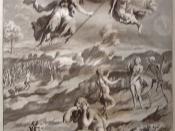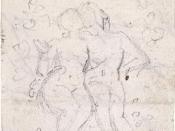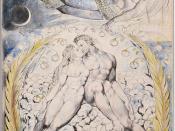Considered by many scholars to be one of the greatest poems of the English language, Paradise Lost by John Milton tells the biblical story of Adam and Eve's fall from grace in language that is a supreme achievement in rhythm and sound. Written by a very bitter, very lonely Milton in his mid-50's, the book was widely criticized by the Catholic church. People wondered whether Milton sought to justify the mysterious ways of God or merely show the cruelty of the Christian religion. Despite it's obvious distain for authority, Milton shows his beliefs on society and religion through the various themes of the poem.
The very first line of Paradise Lost tells us that this will be a story "of Man's first disobedience". From this line on Milton warns the reader of the importance of being loyal to God. Milton begins his poem by illustrating the sins of Adam and Eve as they both take their bites of the forbidden fruit.
This disobedience against God mirrors the larger rebellion of Satan. Raphael attempts to warn the two of the dangers of being disloyal by telling of the severe threat that Satan poses to humankind. Adam and Eve are the first humans to disobey God and face his wrath, but Satan is the first creation of God to disobey. Unlike Adam and Eve, Satan is not tempted or seduced into disobeying his creator; he does so on his own free will. This contrasts to Adam and Eve who are both beguiled into eating the fruit by the snake. Furthermore, Adam and Eve do not continue to sin after their bite of the forbidden fruit, offering them a chance at redemption, unlike Satan who continues to sin after the fall. Adam and Eve, as well as all humankind, are able to repent...


